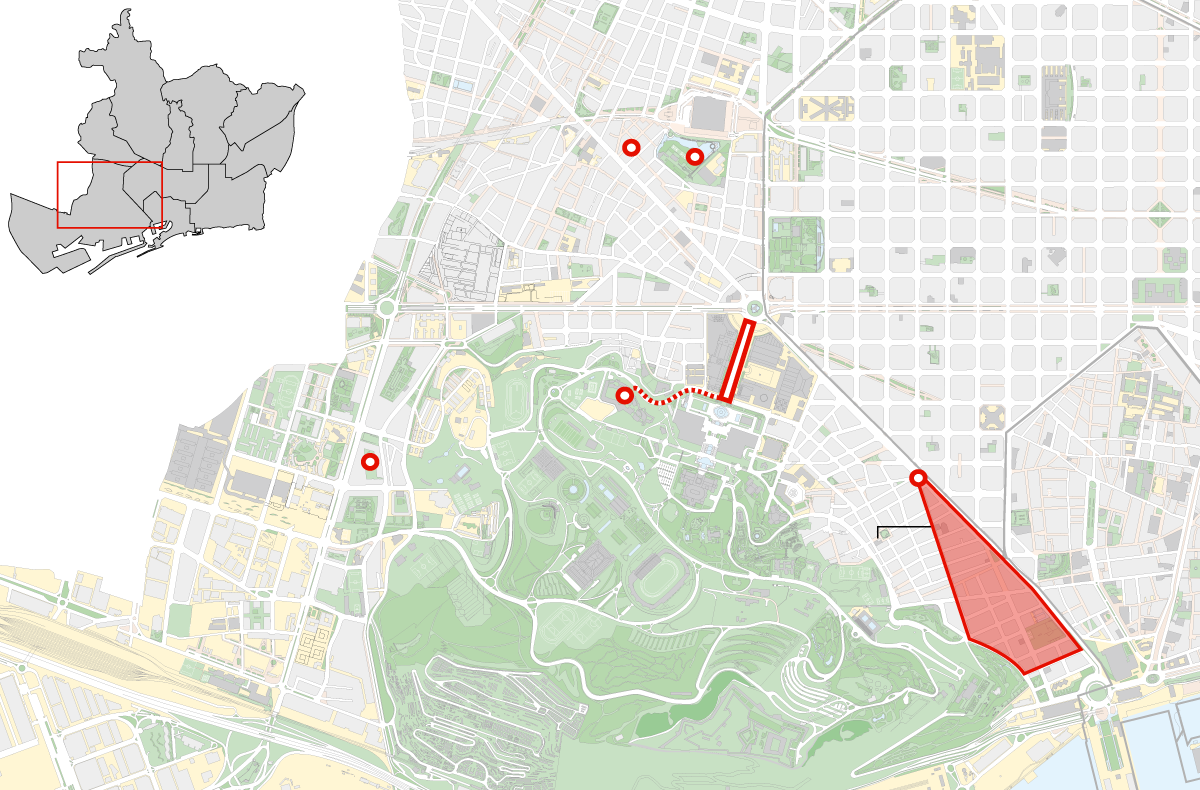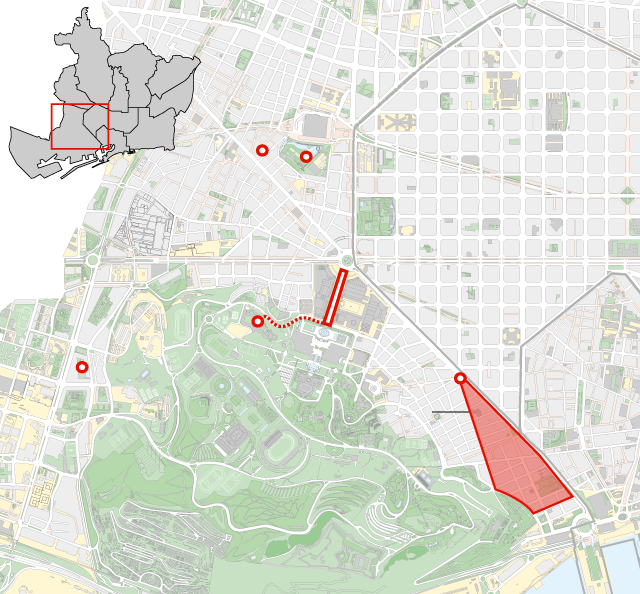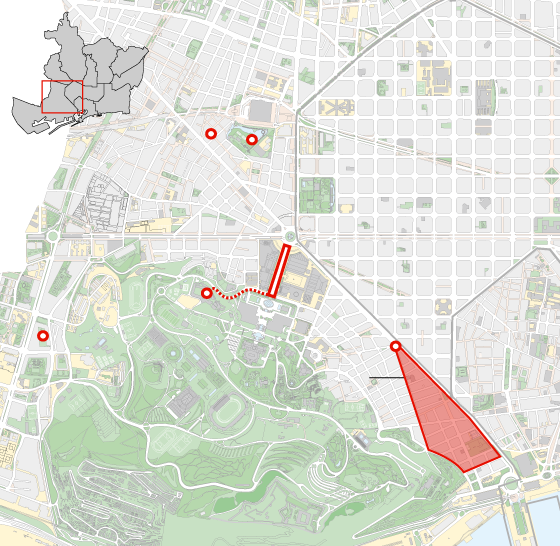Mayor seeks agreements with bars and nightclubs to tackle noise and illegal parties
The City Council joins forces with Apolo night club to get revellers to enter club earlier


Barcelona"The solution? That all outdoor seating be closed at ten o'clock at night and then we'll sleep for sure". This is Isabel and Marta's verdict, sitting on a bench in the Jardins de la Mediterrània, large square in Marina neighbourhood of Barcelona, but which does not close at night and is home to bars, most with outdoor seating and one which opens till late. "There is always activity here... and, of course, noise", these neighbours sum up. In total, nine outdoor seating areas with about thirty tables. Arguments and fights often break out, and chairs are thrown. Sporadically objects are also thrown from windows towards the customers, some restaurateurs report.
The difficult coexistence between neighbours and bars' outdoor seating is not exclusive to the most central areas of the city. It is not only Enric Granados and Blai streets or in the squares of Gràcia and Ciutat Vella. In fact, the Sants-Montjuic district considers these gardens a priority when it comes to applying measures such as the possible reduction in opening hours for outdoor areas. This solution is already being applied in Blai street in Poble-sec and Plaça d'Osca, which have to close an hour earlier than the rest at 11pm. This measure may later be rolled out to the rest of the city.
The Jardins de la Mediterrània, which were renovated before the pandemic, are clear candidates for the application of restrictive measures on bars and restaurants, as confirmed by district councillor Marc Serra, who says that in this first phase is seeking the complicity of restaurateurs to alleviate noise problems. And, despite the fact that they were not part of the eleven zones that the City Council identified as causing the most nuisance at night, they will be included in the decree that includes the measures to be applied.
"These neighbours have the same right to rest as those of the Eixample", Serra remarks. At the moment, sound meters have been installed as in the rest of critical areas to measure the problem. After the summer of 2021 was especially complicated by the botellones, this 2022, without restrictions and with the return of tourists, is expected to be a summer campaign also difficult for the coexistence between rest and nightlife. The areas that will receive special attention are the nightlife area in Poble-sec (especially the Parc de les Tres Xemeneies), the Sants area around Plaça d'Osca, the Jardins de la Mediterrània, the surroundings of Poble Espanyol (and Avinguda Maria Cristina) and the Parc de l'Espanya Industrial, which last year was the scene of large parties.
Entering the Apolo earlier
One of the critical points is the Parc de les Tres Xemeneies, on Paral·lel, especially on Thursday nights, which is when many young people tend to gather to drink on this square before entering Apolo nightclub. To attack this practice, the City Council claims it has mounted a specific police operation which wants to get people into the club earlier. Those drinking on the square will be fined, and the Council hopes this will reduce noise levels endured by neighbours.
In addition, Apolo will take on the cost of the two portable toilets installed in the area on Thursday nights to prevent young people from using Palaudàries street as a large urinal (it costs about €200 each week) and clubbers going in before 1 am will enjoy a discounted tickets. Apolo assures that it has "maximum" predisposition to collaborate with the City Council to try to minimise its impact on the neighbourhood and that it has also started a campaign to ask customers to respect neighbours' rest. "It is a step forward", celebrates Sergi Gàzquez, president of the Poble-sec Neighbourhood Association, who claims the situation on the square has been "worrying" for months. He also believes it would be good for a café to be installed on the square during the day, so more families used the space.
According to the district councillor, the plan to deal with botellones is beginning to show results: about a month ago there were over 300 people drinking on the square who did not enter Apolo until after 3 am, whereas now the police starts giving out fines at 1.30 am and the everybody leaves the square. "Apolo has a capacity for about 3,000 people and this has a very strong impact on a dense neighbourhood such as Poble-sec, so we have to implement preventive measures and co-responsibility is needed," the councillor explains. The priority action in Poble-sec includes Blai street, due to the large amount of outdoor seating, as well as streets such as Vila i Vilà and Nou de la Rambla, which have 17 restaurants and 3 nightclubs. Here contacts have begun with restaurateurs to ask for maximum respect for the timetables and controls so that customers do not make noise when leaving. On Nou de la Rambla street sound metres have been placed to decide actions for July and, in addition, it is already clear that they will not be able to keep all the extra outdoor seating installed during the pandemic.
Prevention in Parc de l'Espanya Industrial
There is also a specific plan for the Plaça d'Osca in Sants, where, as in Blai street, outdoor seating closes an hour earlier. Within Sants's nightlife area, there are 38 restaurants and 42% are on Plaça d'Osca, where most customers are from the neighbourhood, according to a local council study. Here outdoor seating areas have been forced to close at 11pm since 2017, but there are also proposals such as placing rubber blocks on tables and chairs so that they do not make so much noise when they are being put away, which many bars do not do until they are fully closed.
The municipal plan also focuses on getting party-goers to leave Poble Espanyol in an orderly manner, to minimise the acoustic impact on the Font de la Guatlla neighbourhood. As for Parc de l'Espanya Industrial, which last year saw huge illegal parties during the neighbourhood's main festival, police expect the greater availability of nightlife venues to contribute to avoiding the same from happening again.



